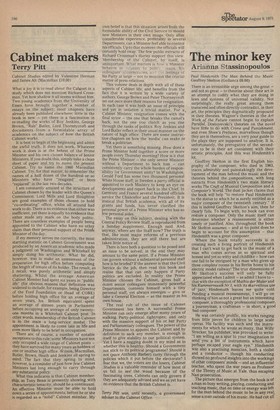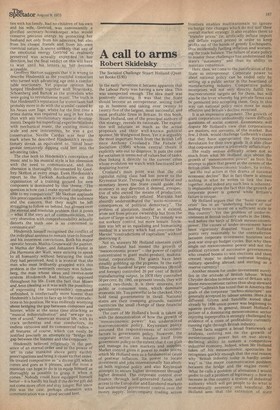The minor key
Arianna Stassinopoulos
Paul Hindemith The Man Behind the Music Geoffrey Skelton (Gollancz 66.00) There is an irresistible urge among the-great --and not so great — to theorise about their art in an attempt to codify what they are doing in laws and systems of universal validity. Not surprisingly, the really great among them transcend and often directly contradict, in their art, the principles they dogmatically propound in their theories. Wagner's theories in the Art Work of the Future cannot begin to explain Parsifal, Dostoyevski's theories on the novel have littie to do with, Crime and Punishment, and even Shaw's Prefaces, marvellous though they are in themselves, are a very poor guide to the plays they are supposed to analyse. It is, unfortunately, the prerogative of the secondrate to be in their art consistent with their artistic principles. And this was Hindemith's lot.
Geoffrey Skelton in the first English biography of the composer, who died in 1963, traces admirably and painstakingly the development of the man behind the music and the theories behind the compositions, with long extracts from Hindemith's two main literary works The Craft of Musical Composition and A Composer's World. The dust jacket claims that the book will help "to restore Paul Hindemith to the status to which he is surely entitled as a major composer of the twentieth century." If this is indeed Geoffrey Skelton's aim, then he clearly fails. To begin with, no book can ever restore a composer. Only the music itself can determine whether a reassessment is either timely or justified. Also, throughout the book Mr Skelton assumes — and at no point does he begin to account for this assumption — that Hindemith was a great composer.
Where the book totally succeeds is in creating such a living portrait of Hindemith that I can't wait to get back to the music of a man who comes across as so spiritual and honest and yet so witty and childlike — how can one fail to be intrigued by a man who gives up three complete rooms in his Berlin home to his electric model railway! The true dimensions of Mr Skelton's success will only be fully appreciated when 1 admit — as admit I have to — that with the exception of Mathis der Maier and his Kammermusik Nr I, with its marvellous use of jazz, Hindemuth leaves me quite cold. Pending a musical reassessment, I will go on thinking of him as not a great but an interesting composer, a thoroughly professional composer, a journeyman, a craftsman — in short, a good bad composer.
He was certainly prolific, his works ranging from little pieces for children to large scale operas. His facility was such and the instruments for which he wrote so many, that Willy Strecker, his publisher, was provoked to write: "I am willing as a spur to your imagination to send you a list of instruments which have perhaps escaped your eagle eye." Hindemith was also a practising musician, both a violist and a conductor — though his conducting showed no profound insights into the workings of other composers' minds — and an influential teacher, who spent the war years as Professor of the Theory of Music at Yale, thus escaping Nazi prosecution.
The picture that emerges from the book is of a,man so busy writing, playing, conducting and teaching music, that no time or energy was left for the man behind the music to be in any reati sense a man outside of his music. He had cut all ties with his family, had no children of his own and his wife, Gertrud, was conveniently a glorified secretary/housekeeper who would conserve precious energy by protecting her husband not only from his admirers, but also from his closest friends and from his own convivial nature. It seems unlikely that any of the emotional energy Gertrud so zealously preserved was actually expended in her direction, but the final verdict on this will have to wait until his letters to her become accessible.
Geoffrey Skelton suggests that it is wrong to describe Hindemith as the youthful iconoclast who turned with advancing age into a comfortable reactionary. Yet popular opinion had lumped Hindemith together with Stravinsky, Schoenberg and Bartok as the atonalists who were going to revolutionise music. The truth is that Hindemith's reputation for iconoclasm had probably more to do with the scandal caused by his Neues vom Tage, where for the first time a prima donna was required to sing in her bath than with any revolutionary musical developments. Despite his superficial experimentations with mechanical music, the existing musical scale and new instruments, he was a gut conservative. Neville Cardus was near the mark when he described Hindemith's revolu
tionary streak as equivalent to -timid bourgeoisie tentatively dipping cold feet into the advancing tides."
The clue both to Hindemith's conception of music and to his musical style is his obsession with the need to communicate, and this obsession is thoroughly documented by Geoffrey Skelton at every stage. Even Hindemith's report to the Turkish Authorities on the organisation .of a training ground for new composers is dominated by this theme: "The question is how can I make myself comprehensible to my compatriots?" Mr Skelton applauds this preoccupation with involving the audience and the concern that they might be left struggling to follow on behind, but glosses over the eternal and insoluble problem that it poses — what if the very act of communication, the very obsession with comprehensibility actually distorts the truth one is so concerned to communicate?
Hindemith himself recognised the conflict of the individual anxious to remain true to himself and his innermost convictions. Both his major operatic heroes, Mathis Grunewald the painter, in Mathis der Maier, and Johannes Kepler in .Die Harmonie der Welt, were striving to speak to all humanity without betraying the truth they had perceived. And it is ironical that the man who most brilliantly grappled with this problem in the twentieth century was Schonberg, the man whose ideas and twelve-note system Hindemith had bitterly opposed throughout his life. Even-the fact that Moses and Aron (dealing as it was with the possibility of expressing the inexpressible) remained unfinished, is intellectually more honest' than Hindemith's failure to face up to the contradictions in his position. He was endlessly worrying about bridging the gap between composer and listener, while at the same time attacking as "musical industrialisation" and "sewage system of sound," American musical life, with its crack orchestras and star conductors, its endless virtuosos and its commercial radios — all features, of course, which can easily be justified precisely as attempts to "bridge the gap between the listener and the composer," Hindemith believed religiously in the presence of an eternal order and in the power of 'art' to raise mankind above petty earthly preoccupations and bring it closer to that order. He treated composition as "a divine gift which comes and goes as it pleases, and the most a musician can hope to do is to equip himself as thoroughly as possible to grasp it when it comes." Nobody could have equipped himself better — it is hardly his fault if the divine gift did not come more often and stay longer. But since this was the case, perhaps obsession with communication was a good second best.



































 Previous page
Previous page